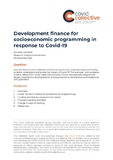| dc.contributor.author | Lenhardt, Amanda | |
| dc.date.accessioned | 2022-01-13T15:36:36Z | |
| dc.date.available | 2022-01-13T15:36:36Z | |
| dc.date.issued | 2021-11-29 | |
| dc.identifier.citation | Lenhardt, A. (2021). Development Finance for Socioeconomic Programming in Response to Covid-19, Covid Collective Helpdesk Report 9, Brighton: Institute of Development Studies, DOI: 10.19088/CC.2021.009 | en |
| dc.identifier.uri | https://opendocs.ids.ac.uk/opendocs/handle/20.500.12413/17057 | |
| dc.description.abstract | The Covid-19 crisis led multilateral and bilateral donors to revise their funding strategies to respond to the crisis and to adapt existing programming to the new context it created. This resulted in changes to overall allocations, with some countries increasing aid commitments and institutions like the World Bank scaling up lending to low- and middle-income countries while others have cut aid budgets due to low economic growth and demands on domestic resources at home. Changes in aid volumes and disbursal mechanisms are anticipated to have significant impacts on low- and middle-income countries’ abilities to cope with the crisis in the short term, and the targeting of these investments are likely to have a lingering effect on recoveries for years to come. Although aid makes up a small proportion of countries’ available finance to tackle the Covid-19 crisis, “other financing options such as foreign direct investment, workers’ remittances, and taxes – have fallen and are slow to recover” (Prizzon, 2021). Aid finance will therefore be critical to many countries’ short-term responses to Covid-19 and capacities to abate longer-term negative impacts on social and economic outcomes as countries begin to recover.
This report gives a broad overview of trends in bilateral, multilateral, and private foundations’ funding strategies over the course of the pandemic to highlight observable shifts in practice. The review is based on a rapid search of funding announcements from a selection of bilateral donors, a selection of multilateral institutions, and overall trends reported by foundations. The report also includes evidence reported by secondary literature on finance for development over the course of the Covid-19 crisis. | en |
| dc.language.iso | en | en |
| dc.publisher | Institute of Development Studies | en |
| dc.rights.uri | http://creativecommons.org/licenses/by/4.0/ | en |
| dc.subject | Finance | en |
| dc.subject | Health | en |
| dc.title | Development Finance for Socioeconomic Programming in Response to Covid-19 | en |
| dc.type | Other | en |
| dc.rights.holder | © Crown copyright 2021. | en |
| dc.identifier.doi | 10.19088/CC.2021.009 | |
| rioxxterms.funder | Default funder | en |
| rioxxterms.identifier.project | Default project | en |
| rioxxterms.version | VoR | en |
| rioxxterms.versionofrecord | 10.19088/CC.2021.009 | en |
| rioxxterms.funder.project | 9ce4e4dc-26e9-4d78-96e9-15e4dcac0642 | en |


